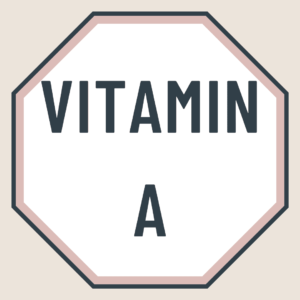What is Vitamin A?
Vitamin A is a fat-soluble vitamin which helps maintain normal reproduction, vision, immune function and integrity of cells throughout the body. It has a number of forms such as retinol or retinal and the precursor of vitamin A is beta-carotene.
Some conditions that may present with vitamin A deficiency: acne, allergies, decreased immune function

RDI
Age | Male Recommended intake | Female Recommended intake | Pregnancy (P) + Lactation (L) |
0-6m | 250 µg Retinol | 250 µg Retinol | |
7-12m | 430 µg REs | 430 µg REs | |
1-3yr | 300 µg REs | 300 µg REs | |
4-8yr | 400 µg REs | 400 µg REs | |
9-13yr | 600 µg REs | 600 µg REs | |
14-18yr | 900 µg REs | 700 µg REs | 700 µg REs (P) 1100 µg REs (L) |
19+ yr | 900 µg REs | 700 µg Res | 800 µg REs (P) 1100 µg REs (L) |
*1 international unit (IU) = 0.3 µg Retinol equivalents (REs)
Sources of Vitamin A (vegetarian)
Focus on fruits and vegetables – especially red, orange and yellow ones!
- Sweet potato (baked with skin) – 1 whole = 1403 µg REs
- Spinach ½ cup = 573 µg REs
- Carrots raw ½ cup = 459 µg REs
Sources of Vitamin A (animal)
- Beef liver – 85grams = 6582 µg REs
- Fish oils (e.g. Atlantic Herring, pickled) 85g = 219 µg REs
- Egg (particularly yolk) – 1 hard boiled = 75 µg REs
- Milk, cheese and yogurt (full-fat)
Meal options ( suggestions)
Please find attached Link to a SPECIALISED DIET PLAN RICH IN VITAMIN A CREATED BY OUR EXPERT NUTRITIONIST AND NATUROPATH
CLICK HERE

